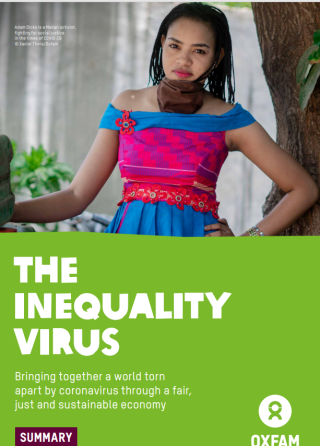Oxfam Report shows pandemic increasing inequality

A recent Oxfam report, published for the opening day of the World Economic Forum, reveals that the world’s 10 richest men saw their wealth increase by half a trillion dollars during the pandemic, while the 1,000 richest people on the planet recouped their Covid-19 losses within just nine months.
The Inequality Virus, Bringing together a world torn apart by coronavirus through a fair, just and sustainable economy looks at considers the impact of the Covid-19 pandemic on an already unequal world, and how, during a time when the poorest were most affected by the virus, the wealth of some of the world's richest grew. Some major findings of the Report include:
- The top 1,000 billionaires recouped their pandemic-related losses in just nine months, while it could take up to a decade for the world's poorest to recover.
- The increase in wealth of the ten richest billionaires since the pandemic began would be enough to prevent anyone on earth from falling into poverty due to the virus and pay for vaccinations for all.
- In the United States, if the mortality rate of black and Latin Americans was the same as white Americans, almost 22,000 people from these communities would still be alive.
- If women and men were equally represented in the sectors most affected by the pandemic, 112 million fewer women would be at high risk of losing their incomes or jobs.
Oxfam's survey of economists worldwide found that 87 per cent felt that the pandemic would lead to an increase or a major increase in income inequality in their country.
Oxfam Ireland are calling for the Irish Government to:
- Support the call for a global ‘People’s Vaccine’ to ensure Covid-19 vaccines are made a global public good—free of charge to the public, fairly distributed and based on need.
- Support calls for a tax on the excess profits earned during the pandemic by corporations the world over which could generate $104bn - enough to provide unemployment protection for all workers, and financial support for all children and elderly people in the poorest countries.
- Significantly increase investments in public services and social infrastructure, especially the care economy, while prioritising gender budgeting and the equality budgeting process.
- Bail out businesses responsibly. Priority must be given to supporting small businesses that have the least ability to cope with the crisis. Any public support for large corporations should be conditional on measures that uphold the interests of workers, farmers and taxpayers and build a sustainable future.
- Fulfil their commitment to develop a new set of indicators to monitor and progress societal well-being and reduce inequality, while ensuring that economic development remains within planetary boundaries.

GIVING A VOICE TO THOSE
WHO DON’T HAVE A VOICE
When you support Social Justice Ireland, you are tackling the causes of problems.
